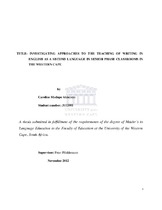| dc.description.abstract | South Africa in the past-apartheid era has undergone a series of curriculum changes that collectively have not yet yielded the desired results. Evidence of this is to be found in the continued low pass rates and poor performance in the annual National Senior Certificate (Grade 12) examinations, including the subject English as a First Additional Language (EFAL). Apart from language policy considerations, reasons related to the teaching approach used in EFAL may have a bearing on the results.The Revised National Curriculum Statement (RNCS) recommends the use of a text-(genre) approach, alongside a communicative approach, to the teaching of languages in schools to replace the old content-based methods with their aims and objectives. While the old curriculum did advocate communicative language teaching, the addition is a text-based approach. This study focuses on investigating the various approaches teachers employ in the teaching of English writing and specifically seeks to identify the extent to which a text-based approach is realized in
the teaching of EFAL in Grade 9 in two schools in the Western Cape. The study does so, amongst other ways, by analysing the various texts learners are exposed to in English lessons and taking note of how teachers introduce and negotiate the different stages of writing. This study uses genre theory and Systemic Functional Linguistics (SFL) in combination with social constructivist approaches to language learning. This theory is based on the premise that language is functional and cannot be detached from the social context of the learner.A qualitative research paradigm is used and the study is underpinned by interpretive theory.According to Richards (2003), qualitative research is the study of human action in its natural
setting in the context of people’s daily lives. In this case the school classroom has to function as the natural setting. The qualitative data collection instruments for this study include interviews,(particularly open-ended interviews), classroom observation schedules and audio recordings. The teaching processes in the classroom and interview sessions are recorded.The research participants for this study were two qualified English teachers. Secondly, samples of notebooks including class exercises of a selected numbers of learners of English Language in
Grade 9 were collected for analysis with regard to the implementation of a text-based approach.The findings revolve round the themes derived from the analysis chapter, and are expected to provide ways of promoting the teaching of English using this approach. They reveal that the teachers in this study do not have sufficient understanding of the theories that underpin the teaching of writing in the English FAL curriculum. They attend to the use of text-based approach superficially but they apply other teaching strategies in their lessons during the teaching of English as a first additional language. The study concludes by summing up the main findings,and by spelling out some implications for further research. | en_US |

